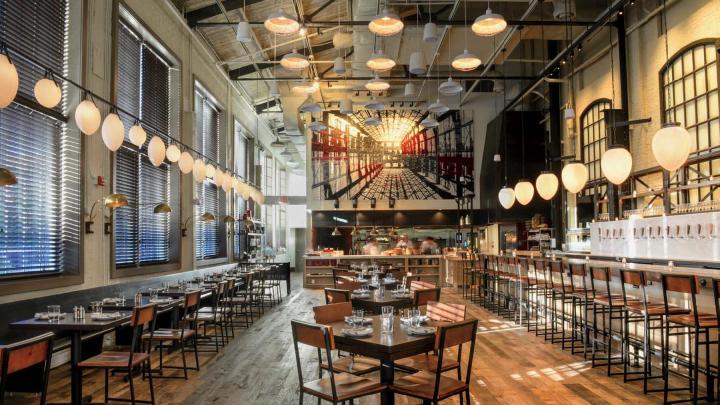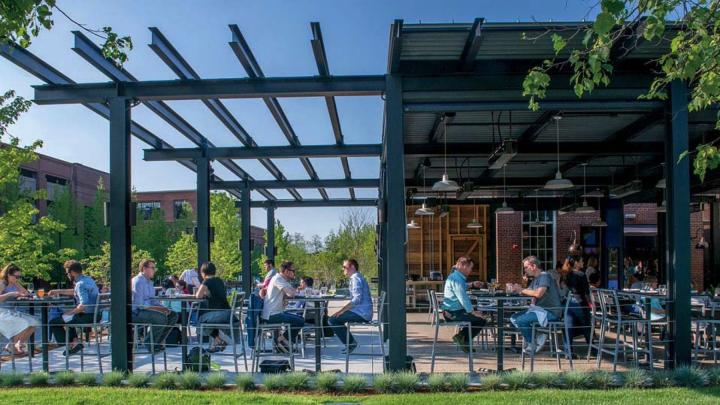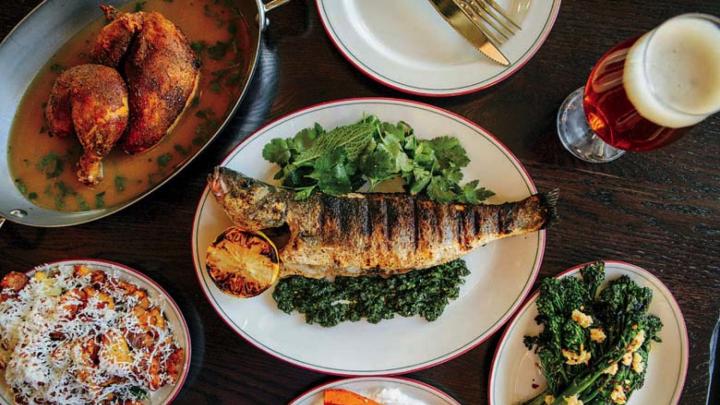Patio diners at Branch Line can watch the sun go down—and might even catch a breeze from the Charles River—amid the Watertown Arsenal’s historic red-brick buildings. The restaurant sits blissfully removed from traffic, and often feels as if it’s in its own quiet little neighborhood.
Then there’s the food. Branch Line is a partnership between the owner and the general manager of Eastern Standard, in Boston, and shares its brasserie-style flair. Slow-cooked French rotisserie chicken ($19/$38) and grilled steak ($24) rightly lead the menu. But the potato gnocchi with “beef-cheek ragu” and pecorino ($23) is a rich treat, or go for the more nuanced grilled branzino (whole fish, or filet), with olives, harissa, and a side of micro-greens ($28). The vegetarian entrée, though—featuring chunks of smoked eggplant over too-dry braised chickpeas and a layer of almond romesco—tasted something like a burnt oven smells.
Sides and starters had more zip. Steamed mussels came in a beer-laced broth spiced with Calabrian chiles ($14). The sugar-snap-pea salad, with marcona almonds and loads of ricotta cheese and fresh mint, was crunchy and refreshing ($12). The lamb and pork meatballs drenched in sugo al pomodoro—classic tomato sauce—were divinely filling ($5).
There’s no hard liquor: Branch Line serves wine, beer, and mocktails. Friendly, assiduous staff can describe every one of the 20 rotating craft drafts. A few are familiar (German wheat-ale and Jack’s Abbey lager), but most are not. Note: the Tartare Rouge, from California’s Bear Republic Brewing Co., is sour red ale fermented with “airborne wild yeast and bacteria.”
Adventurous beer hounds are among the families, celebrants, and date-nighters who frequent Branch Line. Post-work relaxers who stream over from the arsenal’s 11 buildings boost the bar tab and neighborly vibe. No homes exist on the current “campus,” as the arsenal is now called by owner and primary occupier, Athenahealth (to which Harvard sold the property in 2013), but Branch Line is joined by the very good, La Casa de Pedro, which serves Mexican, Latin American, and Venezuelan dishes, and the Mosesian Center for the Arts (galleries, classrooms, and live theaters), along with a seasonal farmers’ market and special public events, like outdoor concerts. Fledgling trees, native plants, a central plaza, and other new landscaping are further signs of Athenahealth’s efforts to reinvigorate this corner of urban life. The oldest buildings date to the Civil War, but the arsenal itself (designed by Boston architect Alexander Parris, later known for Quincy Market) was originally established in 1816 by the U.S. Army, and is now on the National Register of Historic Places. (For self-guided tours, visit http://thearsenalonthecharles.com/history/walkingtour.)
For its part, Branch Line has integrated modern, industrial-chic décor with preserved elements like tall windows and exposed steel beams, and attracted a lively following—thus laudably linking community development and history through its delicious food.










